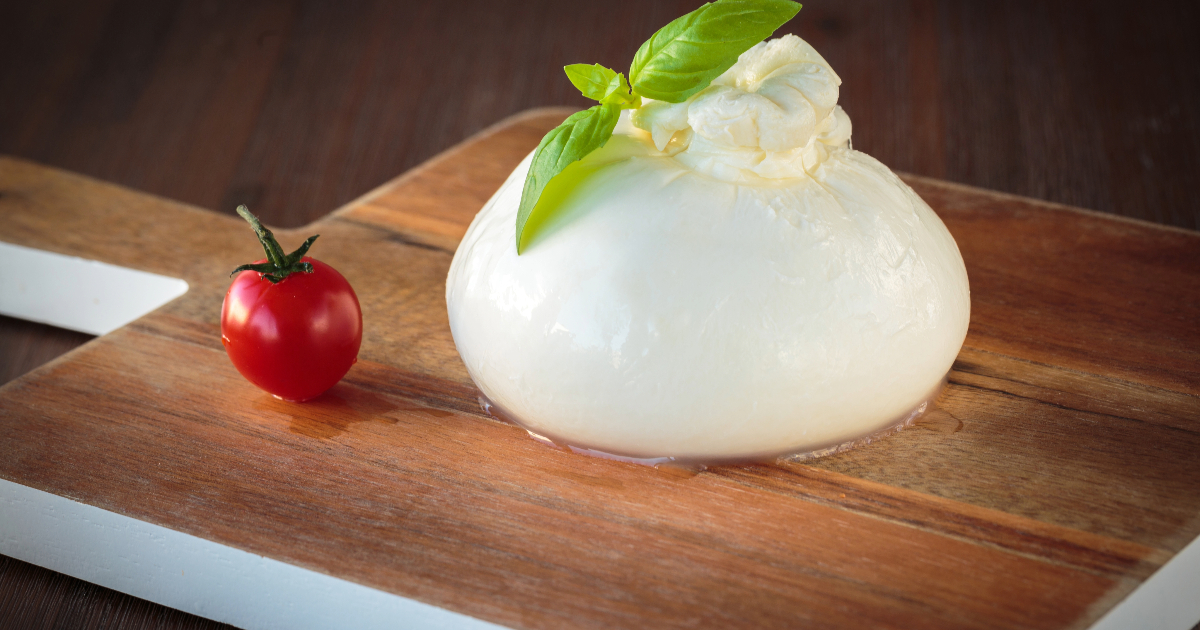Colby and mozzarella are two popular types of cheese, each with their own unique characteristics.

But what exactly sets them apart?
How Colby and Mozzarella Cheeses Are Made
To understand what makes colby and mozzarella unique, it helps to first look at how each cheese is produced:
Colby Cheese Production
- Made from pasteurized cow's milk
- Curds are washed in water before heating to stop acidification, giving it a milder flavor
- The washed curds are then heated, molded, pressed and aged for 1-3 months
- Produces a mild, sweet flavor and springy texture
Mozzarella Cheese Production
- Originally made from water buffalo milk in Italy
- Now also made from cow's milk
- Produced using the pasta filata method: Curds are immersed in hot whey, then stretched and kneaded to create signature elastic texture
- Fresh mozzarella is eaten soon after production; low moisture varieties can be aged longer
Key Takeaway: Washing the curds gives Colby cheese its characteristically mild flavor. Mozzarella gets its stretchy, stringy texture from the unique pasta filata production method.
Colby vs Mozzarella: Key Characteristics Compared
Now let's dive deeper into how colby and mozzarella stack up against each other in terms of their main traits and distinguishing qualities:
Flavor and Aroma
- Colby: Sweet, mild flavor. Buttery aroma.
- Mozzarella: Fresh, milky flavor. Faint milky aroma.
So colby has a slightly stronger flavor and aroma profile than fresh mozzarella.
Texture
- Colby: Open, springy texture. Can have tiny holes.
- Mozzarella: Soft, moist interior with stretchy, stringy elasticity. Fresh mozzarella is less firm than aged varieties.
Mozzarella's signature stretch comes from how the curds are manipulated, while colby's springy body is thanks to washing the curds.
Appearance and Color
- Colby: Pale yellow color from annatto dye. Rectangular blocks or "horns."
- Mozzarella: White color unless cow's milk is from grass-fed cattle. Traditionally formed into round balls or braids; also cubed or shredded.
So colby cheese visually resembles many cheddars due to its yellow hue. Mozzarella is white unless the milk source contains more beta-carotene.
Aging Time
- Colby: Aged for 1-3 months
- Mozzarella: Fresh mozzarella eaten soon after making. Low moisture varieties can age longer.
As you can see, colby cheese and mozzarella have noticeable differences across some of their main traits. Keep these comparisons in mind when using them!
Best Uses for Colby vs Mozzarella
Taking into account their individual tastes, textures and melting abilities, here are some of the top applications for colby and mozzarella:
Best Uses for Colby Cheese
- Melting into smooth sauces
- Grilled cheese sandwiches
- Burgers
- Mac and cheese
- Tacos, fajitas
- Pairing with fruits
Best Uses for Mozzarella Cheese
- Caprese salad (tomatoes, basil)
- Pizza
- Pasta dishes
- Paninis and sandwiches
- Adding stretch to melted cheese dishes
- Fresh snacking
In general, both melt beautifully, so they can often be used interchangeably in cooked dishes. But mozzarella offers great stringy stretch, while colby brings more flavor.
Proper Storage for Maximum Freshness
To enjoy the highest quality colby and mozzarella cheeses, proper storage is key. Here are some best practices to maximize freshness:
Colby Cheese Storage
- Wrap in parchment paper or wax paper (not plastic wrap)
- Store in fridge's cheese drawer
- Eat within 1-2 weeks
Mozzarella Cheese Storage
- Fresh mozzarella packed in water or whey; refrigerate unopened
- Store fresh mozzarella wrapped in a damp paper towels or dish towel for up to 10 days
- Low moisture mozzarella blocks or cubes last 2-3 weeks refrigerated
Proper wrapping helps retain moisture and prevent early drying. And fresh mozzarella types have a shorter shelf life, like colby.
Key Takeaway: Wrap colby in paper and eat within 2 weeks. Fresh mozzarella requires sealed moisture to avoid drying out for up to 10 days. Low moisture varieties can last longer.
FAQs
Is colby cheese similar to cheddar? What's the difference?
Colby and cheddar are both yellow, cow's milk cheeses. But they have significant flavor and texture differences:
- Flavor: Colby is mild; cheddar is sharp, nutty
- Texture: Colby has an open, springy body; cheddar is hard and crumbly
- Aging time: Colby ages for 1-3 months; cheddar can age for 12+ months
The key difference comes from the fact that colby curds are washed, which prevents acid development and a stronger cheddar-like flavor.
Can you substitute colby for mozzarella or vice versa?
The good news is yes, colby and mozzarella can usually be swapped in recipes, thanks to their meltability. But expect some differences:
- Colby will contribute a milder, milky flavor
- Mozzarella will provide superior stretchiness
- So while possible, some textural contrast may result
For the closest match in melted applications, opt for a young, mild cheddar rather than colby when substituting for mozzarella.
Does colby cheese melt well? Can it be a pizza cheese?
Colby melts extremely well, even better than many cheddars. So it can definitely be used as a pizza cheese either on its own or paired with mozzarella.
Benefits of using colby on pizza:
- Melts into a smooth, creamy consistency
- Mild flavor compliments other pizza toppings
- Still provides stretch, just less than mozzarella
So the next time you make homemade pizza, give colby cheese a try!
Key Differences at a Glance
For an easy side-by-side comparison of some key traits, check out this quick-reference colby vs mozzarella differences chart:
| Trait | Colby | Mozzarella |
|---|---|---|
| Flavor | Mild, sweet | Fresh, milky |
| Aroma | Buttery | Faint milky |
| Texture | Springy | Soft, stretchy |
| Color | Pale yellow | White |
| Shape | Blocks, "horns" | Balls, braids, cubes |
| Best Uses | Sauces, burgers, sandwiches | Pizza, pasta, caprese |
| Melting | Excellent | Excellent |
| Aging Time | 1-3 months | None (unless low moisture) |
Conclusion
While colby and mozzarella share some similarities like their melting prowess, we've seen that they have distinct differences when it comes to flavor, texture and more.
Colby shines thanks to its ultra-creamy melt and mild flavor that perfectly compliments other ingredients. And mozzarella's fresh milkiness and stringy stretch can't be beat in dishes like caprese salad or on a cheese pull pizza.

